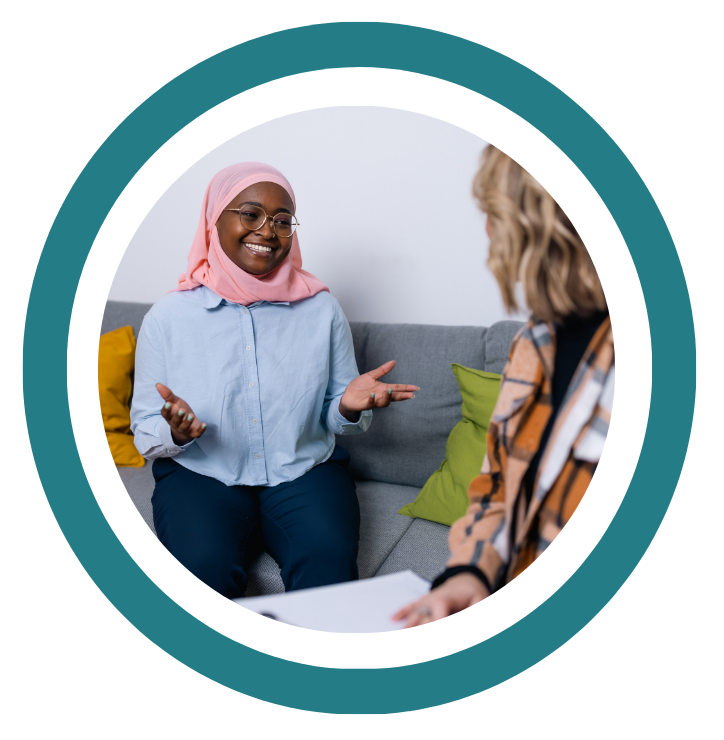
Storytelling for well-being
Storytelling can have a powerful impact on well-being. Fictional stories can help us make sense of the world and realise that we’re not alone. Being able to share our own personal stories can be even more powerful. The following examples show how storytelling can help improve the well-being of people who use and provide social care.

We can use storytelling to improve the well-being of people who use and provide social care. Giving people a chance to feel heard and understood can have a powerful impact on their lives
Building emotional literacy
The feelings are funny things project
Written by Steve Killick
This project has created a storytelling toolkit to support its work with vulnerable learners in schools, foster carers and looked after children. It helps support emotional understanding, confidence, and well-being.
Stories are used to explore emotions, examine how they work and how they can be regulated in ways that are both safe and playful. Storytelling skills are also used to develop confidence in communication.
Find out more:
Creative writing
Written by Kate North
Creative writing, where people draw on their imagination as well as their experiences, can be used to support and enhance the well-being of people accessing care and support, practitioners, and communities.
Creative writing methods are used for enquiry and reflection. They can work effectively, both in individual and group practice. In professional contexts, writing can be used for team building and training. More broadly, it can be used to explore and analyse systems, practices, structures, and dynamics.
Find out more:
Digital story work
Written by Prue Thimbleby
In NHS Wales, digital storytelling is a key method of gathering feedback stories. Digital patient stories are ideal for helping people get their voices heard in a way that leads to learning and service improvement. The method has also been used in social care.
Digital stories are voice recordings put together with one or more images to create a short video.
The model has three basic principles:
- it’s a first person story
- it’s always short – usually under three minutes
- the storyteller remains the director of the story – it’s co-produced.
Find out more:
Narrative therapy
Written by Rosslyn Offord
Narrative therapy was first developed in the 1990s by Michael White and David Epstein. Today it’s used across the world to help both individuals and community groups.
The approach is based on:
- the idea that we understand and live our lives through stories
- stories are created by people in response to their experiences
- dominant stories being unhelpful if they are out of step with our preferred identities.
Narrative therapists listen out carefully for lesser told stories or exceptions to the dominant narratives. Storytelling is facilitated by the therapist, who encourages the person to consider the story in particular ways. Sometimes significant others are brought into the therapy as witnesses to the stories.
Find out more:

Oral histories
Written by Anna Suschitzky
Mencap Cymru has been working with oral history stories from people with a learning disability for over 10 years. This work includes three Heritage Lottery funded projects:
Oral histories are audio recordings that share personal stories and are a way of collecting pieces of history.
The stories gathered were shared in exhibitions across Wales to try and raise awareness, challenge assumptions, and celebrate the history of the people who shared their stories. They were also shared amongst decision and policy makers in Wales to highlight areas of good practice and identify where people need more support.
Find out more:
Spoken word poetry
Written by Duke Al
Throughout human history, poetry has been used to tell stories. Spoken word poetry builds on this tradition by helping people to share their stories and experiences through poetry. It’s a therapeutic approach that creates a safe, empowering environment. For example, it can help young people overcome stigma and open up about their mental health. It’s also worked well with older people who struggle to leave their homes.
Find out more:
https://www.instagram.com/dukealdurham/
Supporting people with complex communication needs
Storysharing
Written by Nicola Grove
Storysharing helps children and adults with learning and communication difficulties to remember and share their own stories. The website provides evidence on the success of the approach and includes story case studies.
The training and consultancy service is used by schools, homes, day services and peer advocacy services.*
Find out more:
*We do not endorse or assume responsibility for information on third party websites or for services that may involve an additional cost. Please check directly with providers.
Supporting well-being in the workplace
CAKE
Written by Kath McDonald
Caring for each other, Attending to what’s important, Keeping connected and Engaging and empowering (CAKE).
This is a free to use, interactive, digital resource designed to support well-being in the workplace. It was developed by Dr Caroline Dickson and Dr Kath MacDonald.
It’s been tested, evaluated and rolled out in organisations across the UK and uses creative methods to help tell stories to support self care and individual and team well-being.
The storytelling ‘slice’ within the CAKE helps people share stories from the workplace using methods that help them feel included, safe and heard.
Find out more:
Telling stories through the arts
The Re-Live project
Written by Karin Diamond
Re-Live is an organisation that helps people reflect on their lived experience. It’s dedicated to improving the well-being of everyone involved in social care through the exploration and sharing of life stories.
For practitioners, sharing life stories with each other can strengthen team dynamics, reduce burnout, and foster a deeper appreciation of cultural diversity. This can lead to a more supportive and inclusive work environment.
For people accessing care and support, it affirms identity, builds trust with caregivers and practitioners, and reduces stress. Unpaid carers benefit from closer caregiving relationships and gain valuable insights and coping strategies. The Re-Live life storytelling principles prioritise emotional well-being and emphasise choice, consent, and inclusivity.
Find out more:
Additional reading
Charon, R. (2006) Narrative medicine: honoring the stories of illness, Oxford, Oxford University Press.
Drumm, M. (2013) ‘The role of personal storytelling in practice’, Insight 23, available at https://www.iriss.org.uk/resources/insights/role-personal-storytelling-practice (accessed: 24 March 2025).
Frank, AW. (1995) The wounded storyteller. Body, illness and ethics (second edition), Chicago, The University of Chicago Press.
Gersie, A. and King, N. (1989) Storymaking in education and therapy, London, JKP.
Hopwood, C., Jennings, S. and Jacksties, S. (2022) The Routledge international handbook of therapeutic stories and storytelling, London, Routledge.
Wilson, M. (2022) Storytelling, Leeds, Emerald Publishing Limited.